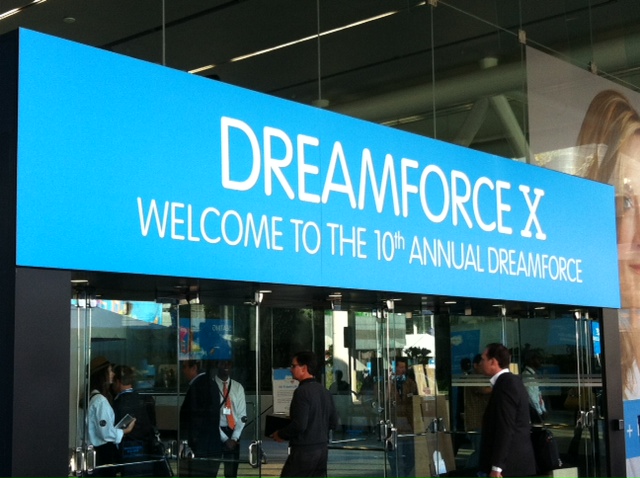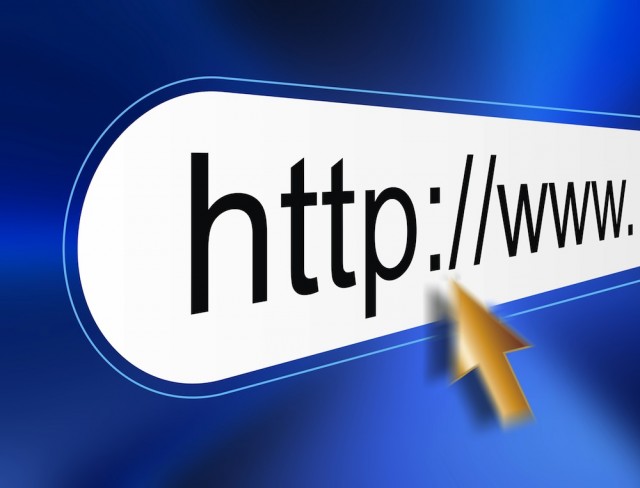01.29
So the session begins with some case studies and interviews with happy Salesforce customers including Comcast, Deliottes and a not-for-profit.
At the front of the bloggers section, things are pretty civilised but that will change in a few minutes as the doors are about to open for delegates.
Similar posts:
11.55
Now we’re into the final run, Marc revisits the Touch mobile plaform and starts the final ‘vignette’ which is Burberry.
The thrust of the Burberry video is how the company is using all of the various Salesforce tools.
“It sounds like Minority Report” Marc asks, “it is” says Angela Ahrendts the CEO of Burberry.
Similar posts:
11.44
George and Dan demonstrate a smart QR-code enabled Coke vending machine. One should worry if the Daleks get this technology.
Now Marc talks with Coca-Cola on integrating an SAP back end with a Salesforce social platform before winding up.
Similar posts:
11.40
George gives a big thank you to those who’ve contributed to the Ideas Exchange and then introduces Salesforce Identity to manage the enterprise social media indentity.
Is this a direct competitor to Google+ or to Microsoft?
The single point of user management was a selling point for the various Microsoft services shown at last week’s Australian TechEd.
Should Salesforce be able to get traction with a corporate identity service then it creates a real threat to Eric Schmidt’s concept of Google+ being the identity management service of choice.
George shows off how the cloud services can be bought together with intelligent vending machines that can even track who scarfed all the diet coke.
Similar posts:
11.28
Now we have a look at Coca-Cola with a historical look at their advertising.
50,000 tweets a day about Coca-Cola and they try to answer every one that is a question.
The concept Coca-Cola putting forward of personalised drink dispensers linked to reward programs and social media is interesting. While it may not work for soda, this is something we will see.
Now George Hu, COO of Salesforce takes the stage. George has a good story himself as he started at the company as an intern.
Similar posts:
11.19
So the work.com system works around awarding badges. Do we get a drink if the word ‘gamification’ is used?
The integration into Amazon allows managers to create incentive prizes.
Tim Campos the CIO of Facebook is introduced by Marc. Applause from part of the audience – not sure if that’s fanbois or Facebook employees.
Similar posts:
11.10
Now we get the demonstration of how Salesforce are looking to change the HR department with Work.com
In many ways the social angle makes sense for HR, one of the failures in the modern corporation is how the employee management has become depersonalised. Even the term “HR” illustrates the industrial machine mindset.
Joh Wookey, EVP work.com and social applications, show off their HR software.
Facebook was one of Work.com’s first customers. This is an interesting alliance.
Similar posts:
11.01
Wow! Marc Benioff is almost as tall as Tony Robbins. I wouldn’t like to meet those two in a dark alley.
Similar posts:
10.59
Harris announces a secure, Salesforce integrated version of Dropbox, Chatterbox.
This is an interesting product as one of the concerns of CIOs and IT folk is the potential security risks of staff sharing documents on public cloud services.
Harris demonstrates how Virgin can use Chatter to expedite customer support. It would have been interesting to how Virgin Australia would have used this feature during their reservations system implosion two years ago.
Notable during Harris’ presentation is how integral iPads are in the demonstration.
Another aspect of the support demonstration is real time advice to passengers through inflight wireless networks and personal IFE systems. It would be hard to see how this could work on airlines like United.
Similar posts:
10.50
Virgin America’s turn arrives. The fastest growing airline in the US using Chatter.
Thirty percent of communication in Virgin happens through tablet devices.
A big call for Chatter and now Salesforce co-founder Parker Harris takes over the presentation from Mark Benioff.
Similar posts:
10.46
Now HP. Now this is a company that needs help both with customers and internally.
George Zimmer, Mens Warehouse CEO now joins Mark and makes the point that his business was built on a billion dollars worth of advertising to baby boomers, marketing to Millennials requires selling through social media.
Similar posts:
10.41
The reskinned Radian6 control panels are shown for the CBAs social presence.
Andy Lark of the CBA joins Mark Benioff, “banking has always been a social business,” Andy says.
Similar posts:
10.30
“By 2017, CMOs will spend more on IT than CIOs” quotes Benioff
Brett Queener EVP of Salesforce’s marketing cloud.
“Social is the biggest change to marketing in sixty years” says Brett. It’s interesting that marketing ceased being social.
Similar posts:
10.28
And now the Aussie contingent. I’m not sure if I’d call the Commonwealth Bank an “amazing company”.
Kaching appears as the CBA first product being showcased which isn’t surprising.
CBA claim Facebook and Radian6 are one of their most effective marketing platforms.
“It’s not about technology, it’s about meeting customers’ needs better.” Is this the same Commonwealth Bank we know in Australia?
Similar posts:
10.24
Now Jeremy Stoppelman from Yelp! joins Benioff.
“Mobile is the core” says Stoppleman which is obvious.
“Monetizing mobile” – is Yelp making a profit?
Similar posts:
10.20
Some screenshots of the control panel for Service Cloud tracking customer issues through social media.
The demo continues in showing the call centre and service desk applications in bringing up a customer’s social media activity along with their service history.
Now we see how customers can use Facetime or any onboard video to diagnose service problems.
Similar posts:
10.11
Now a case study from gaming company Activision. Salesforce’s videos are definately more interesting than a boring IBM style whitepaper.
Fergus Griffin, SVP of Solutions Marketing at salesforce.com shows off the small business aspects of the Servicecloud product.
I wish people would find an alternative to saying “I’m thrilled to announce….”
Similar posts:
10.03
One could say Powerpoint free sales presentations could be one of mankind’s greatest achievements and concludes Hilary’s product demo.
Marc now interviews the CEO of Rossignol, Bruno Cercley before moving onto a Charles Schwab executive.
Similar posts:
09.56
Hilary Koplow-
The audience seems a little underwhelmed by the new Touch iPhone app.
Hilary takes the hall through how the various products integrate through a demo around Rossignol who were showcased in the previous segment.
Similar posts:
09.48
The production values in the videos are exquisite. Salesforce don’t cut corners when it comes to making a promotional clip.
Similar posts:
09.46
And now the business case studies start. It might be worth slowing down the live blog for a while.
Similar posts:
09.44
And so ends the GE segment. As @evanshrugged says on Twitter;
Loving #Dreamforce, but since they’re interviewing GE employees I must say #RememberTesla. GE sucks.
Similar posts:
09.40
Beth Comstock from GE claims her sales team are 100% digitised.
Demonstrating using Chatter for customer, maintenance and design teams working on the early Boeing Dreamliner GEnx engines.
Similar posts:
09.37
“The social revolution is a trust revolution.”
Benioff asks “are you and your company going through a social revolution?’
And now the story of GE and Marc Benioff’s 30 minute conversation on the future of GE with Jeff Immelt.
“I believe the future of GE is the man-machine interface” said Immelt, “we believe the revenue future is becoming a customer centric business.”
GE Share: Jet engines with APIs – a social network around an aircraft turbines or CT scanners that structures customer information and service details.
And now a promo video on GE proclaiming itself to be a social company.
Similar posts:
09.30
“It’s a customer revolution” states Benioff as he prowls the aisles of the hall.
Social is “a fundamental change in business. We saw that to be really successful in this time we had to be a company customers could trust. We’d have to have a level of transparency that has never been seen.”
Similar posts:
09.24
We’re in a social revolution — “you only have to see the news this morning to see how a video can change the world.”
“How many companies here today use social computing in your business in some way?” Most people put up their hands.
“Business is social”.
Similar posts:
09.21
“We are standing on the shoulders of giants” — Watson, Gates, Ellison, Sergei Page all get a mention as building the tech industry with a special shout out to Steve Jobs.
Similar posts:
09.19
For the last decade, Marc has been travelling the world saying “the cloud is coming”.
Putting 1% of equity into charity is “the best decision we have every made” creating million of grants, donations to 16,000 non-profits and 350,000 hours in hours donated by Salesforce staff.
Similar posts:
09.15
Now Marc Benioff takes the stage and thanks the audience for making Salesforce the success it has been.

Similar posts:
09.12
The clip now goes through some of the applications for mobile commerce; aircraft engineers using their iPads to service planes, ordering hot dogs from your stadium seat and, most unlikely of all, making flying a pleasure.
Similar posts:
09.09
Impressive promotional clip to kick off the keynote. A big emphasis on the mobile phone and social.
Too many stats to recount, it’s like a social media expert’s dream.
“Everything is social, everything is in the cloud.”
Similar posts:
09.06
And now MC Hammer takes the stage. Sadly he’s lip synching most of it except for the last rap.
Similar posts:
09.01
Excitement grips the room as the safe harbour investment statement is read out.
Similar posts:
08.59
Now Evan Trent from the School of Rock comes onto the stage to discuss how franchisees use Salesforce’s small business tools like Do.
I had a beer with Evan last night at the media reception, School of Rock has a big operation and they’ve streamlined what was the typical ad-hoc small business mess onto the cloud with Google Apps and Salesforce.
Similar posts:
08.49
So Do.com is kind of a competitor to Basecamp that plugs into Facebook and Google+
Sean announces a Do app for Android and open APIs for developers. We’ll probably hear about many more APIs and app releases.
Similar posts:
08.46
Sean Whitely from Salesforce’s Do.com is now up to give a demo of the business social media platform
Similar posts:
08.44
The San Francisco Mayor Ed Lee now joins the event. He’d be pretty happy with 90,000 attendees today.
Ed makes the case for San Francisco as a technology hub – “San Francisco; innovation capital of the world” and he’s declaring October to be Innovation Month.
“Vote Early and Vote Often” for city Proposition E that gives tax breaks to technology companies based in San Francisco.
Similar posts:
08.37
The customer interviews continue with a small business story in local business Carlos’ Bakery and multinationals in Schneider Electric and Accenture.
Similar posts:
08.34
Whoops! The time settings on the blog were set to Sydney time, so the initial date stamp was 17 hours out. All fixed now.









